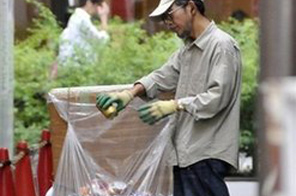Japan's jobless rate hits record high
TOKYO: Japan's unemployment rate is at a record high, data showed Friday, raising doubts about an economic recovery and piling pressure on embattled Prime Minister Taro Aso two days ahead of an election.
The jobless rate rose to a worse than expected 5.7 percent in July, up from 5.4 percent in June, the government said.
More than one million people lost their jobs over the past year, lifting the unemployment total to 3.59 million, as companies slashed costs to cope with the worst recession in decades.
It is unwelcome news for Aso's long-ruling Liberal Democratic Party (LDP), which is trailing far behind the main opposition Democratic Party of Japan (DPJ) in opinion polls ahead of Sunday's general election.
"There's no doubt the job situation is worsening," said Chief Cabinet Secretary Takeo Kawamura, the top government spokesman. "The economy is still in a recovery phase. But we must pay close attention to the job situation."
Official figures last week showed the world's second largest economy returned to positive growth for the first time in five quarters, limping out of recession, but many ordinary people say they are not feeling the recovery.
"The record high jobless rate is bad news for the LDP because ordinary people are sensitive to the job situation," said Masatoshi Sato, chief strategist at Mizuho Investors Securities.
There are also fears that the economy could stumble again as the effects of the government's massive economic stimulus packages fade.
Consumer spending remains weak in Japan, leaving the economy highly dependent on exports. Household spending fell 2.0 percent in July from a year earlier, sharply reversing a 0.2 percent rise in June, data showed.
"The recent growth was mainly due to government spending and was not a self-sustaining recovery in the Japanese economy," said Hiroshi Watanabe, economist at Daiwa Institute of Research.
"We're unlikely to see a swift recovery for the time being. Political uncertainty is also overshadowing prospects for the Japanese economy as we are still unsure about details of the DPJ's economic policies," he said.
Deflation also deepened last month with core consumer prices dropping 2.2 percent a year earlier -- the fastest pace on record.
Core prices, which exclude those of volatile fresh food, fell for a fifth straight month after a 1.7 percent decline in June, the government said.
"The deteriorating job market may depress consumer sentiment and lead to a vicious circle" of weak growth leading to more layoffs, said Naoko Ogata, senior economist at the Japan Research Institute.
"Domestic demand is pretty weak. We expect deflationary pressure to increase."
Japan was stuck in a deflationary spiral for years after its asset price bubble burst in the early 1990s, prompting consumers to put off purchases in the hope of further price drops and reducing corporate earnings.
Even before the latest data was released, the opposition's momentum looked unstoppable.
The DPJ could win more than 300 seats in the 480-seat lower house of parliament in Sunday's election, the Yomiuri Shimbun said after a telephone poll of 85,777 voters from Tuesday to Thursday.
The opposition has pledged to put more money in the pockets of households, with cash allowances for child-raising, free high-school education, an increased minimum wage, petrol tax cuts and an end to highway tolls.






